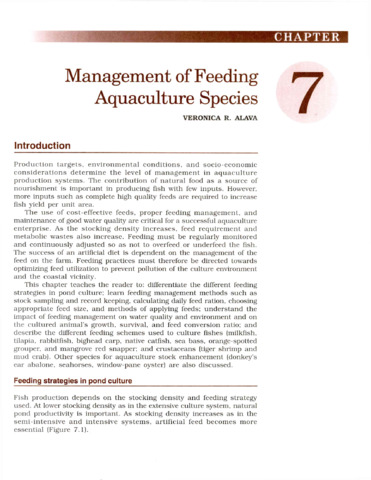Utilization of mung bean, Vigna radiata (Linnaeus) as a novel protein source in practical-type diets for juvenile milkfish, Chanos chanos (Forsskal): Effects on growth, feed efficiency, body composition, and histology of gut and liver
- Global styles
- MLA
- Vancouver
- Elsevier - Harvard
- APA
- Help

View/
Date
2015Author
Page views
5,782ASFA keyword
AGROVOC keyword
Taxonomic term
Metadata
Show full item record
Share
Abstract
A 15-week feeding trial was conducted to determine the optimum partial inclusion of mung bean protein in milkfish diet. Six isonitrogenous practical-type diets with mung bean included at 0%, 4%, 8%, 12%, 16%, and 20% of the diet equivalent to 0%, 3%, 7%, 10%, 13%, and 17% of the total dietary protein, respectively, were formulated. Milkfish with average body weight (ABW) of 8.5 ± 0.23g were distributed in eighteen tanks (6 treatments X 3 replications) with 10 fish each. The fish were fed the diets three times daily. Results showed that growth of milkfish was not adversely affected by the inclusion of mung bean protein at any dietary level. Feed conversion ratio (FCR) and protein efficiency ratio (PER) were significantly improved by the inclusion of mung bean at 20% of the diet. Nutrient compositions of the fish carcass were similar in all diets. Furthermore, no detrimental effects attributable to mung bean inclusion were seen in terms of protein retention, hepatosomatic index (HSI), and liver and midgut histology of the fish. Overall, mung bean is a promising protein source for milkfish and can be included up to 20% of the diet contributing as much as 17% of the total dietary protein without detrimental effects on growth, feed performance, PER, protein retention, HSI, and liver and intestinal histology.
Suggested Citation
Apines-Amar, M. J. S., Coloso, R. M., Amar, M. N. G., Golez, M. S. M., Bunda, M. G. B., & Jaspe, C. J. (2015). Utilization of mung bean, Vigna radiata (Linnaeus) as a novel protein source in practical-type diets for juvenile milkfish, Chanos chanos (Forsskal): Effects on growth, feed efficiency, body composition, and histology of gut and liver. The Israeli Journal of Aquaculture-Bamidgeh , IJA_67.2015.1237, 10 pages. http://hdl.handle.net/10862/2945
Type
ArticleISSN
0792-156XCollections
- Journal Articles [1262]
Related items
Showing items related by title, author, creator and subject.
-
Management of feeding aquaculture species
Alava, Veronica R. (Aquaculture Department, Southeast Asian Fisheries Development Center, 2002)This chapter teaches the reader to: differentiate the different feeding strategies in pond culture; learn feeding management methods such as stock sampling and record keeping, calculating daily feed ration, choosing ... -
Potential of feed pea (Pisum sativum) meal as a protein source in practical diets for milkfish (Chanos chanos Forsskal)
Borlongan, Ilda G.; Eusebio, Perla S.; Welsh, Tim (Elsevier, 2003)A 12-week feeding trial was conducted to evaluate the use of feed pea meal as a dietary protein source for juvenile milkfish. Six isonitrogenous (30% crude protein) and isocaloric (16.5 kJ/g) practical diets were formulated. ... -
A preliminary study on the purified test diet for young milkfish, Chanos chanos
Lee, Dong-Liang; Liao, I-Chiu (Aquaculture Department, Southeast Asian Fisheries Development Center, 1976)In studying the nutritional requirements of young milkfish experiments were conducted to develop a purified test diet. Mixtures of the purified constituents tested were: vitamin-free casein, vitamin-free gelatin, supplemented ...





